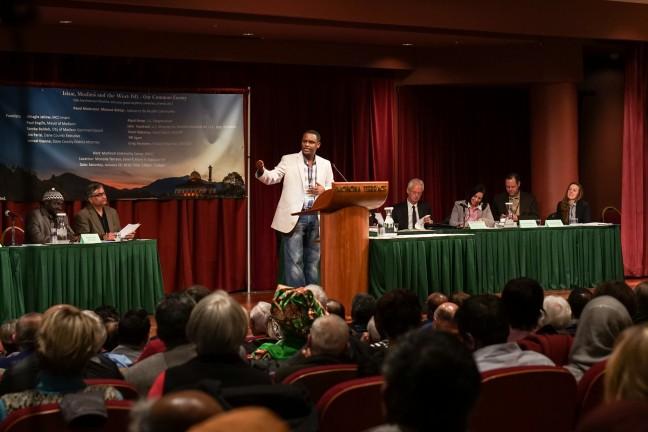In the wake of recent presidential campaign rhetoric, some communities have seen their mosques vandalized. But in Madison, Muslim students and community members said they have seen nothing but support and efforts toward greater communication.
On campus and within the city, Muslims continue to reach out and educate the general public about their faith and counter what they see as misinformation from some high profile figures. Local Muslim leaders said in spite of this rhetoric, or perhaps because of it, they have seen more support and instances of solidarity.

As part of this push to inform the public, Muslim community leaders and government officials hosted a panel Jan. 23 to open the dialogue on understanding Islam and the threat of ISIS. At the panel, local leaders discussed how Islam’s message as a religion can become distorted and how groups using violence in the name of Islam pose a threat to Muslims as well as western society.
Mayor Paul Soglin said the way Muslims are being described is not a unique occurrence, citing the U.S.’s history of prejudice. Regarding Muslim immigrants, Soglin said the country should accept them not for reasons of self-interest, but for humanitarian reasons.
“Open the doors, there really should be no doors, and when we do it has to be from our hearts,” Soglin said.
Recently, presidential candidate Donald Trump called for a ban on Muslims entering the U.S. and closer monitoring of Muslims already within the country.

Hani Rustom, president of the University of Wisconsin Muslim Students Association, said his organization continues to host events aimed at teaching students about Islam and the problem of radical groups, such as ISIS. The goal of his organization, Rustom said, is to foster a community of Muslims while also teaching the student body about the religion.
Support from the university and students, Rustom said, has actually increased recently.
Masood Akhtar, advisor to the Madison Muslim community, painted a similar picture in describing how Madison has responded. He said efforts from elected officials have been particularly admirable, such as U.S. Rep. Mark Pocan, D-Wisconsin, inviting Ald. Samba Baldeh, District 17, a practicing Muslim, to the State of The Union.
Madison alder to attend SOTU in show of solidarity with Muslim community
The biggest concern over recent inflammatory rhetoric, Akhtar said, is the environment of fear it can create within the population at large.
“When you create an environment of fear, some people take that and do something they aren’t supposed to do,” Akhtar said, referring to acts of vandalism against mosques and other hate crimes against U.S. Muslims. But Akhtar said Madison has been spared from any such activities.
Akhtar said rhetoric that paints Islam as an inherently violent religion should be condemned. He said close cooperation between the Madison Muslim community and federal law enforcement in preventing acts of terror shows just the opposite.

The Muslim community, Akhtar said, has condemned radical groups, such as ISIS, from the beginning of their existence. He also criticized the tendency for media attention to focus on the religion in cases where Muslims commit acts of terror, but not when these acts are perpetrated by others.
Baldeh, who has been very active in the Madison community, said he too has seen wide support within the city. He said his efforts to educate the public about Islam have continued since returning from the State of the Union.
Rustom said ultimately the danger posed by inflammatory rhetoric can be neutralized through promoting a general understanding of the faith.
“For a Muslim, the traditional greeting is ‘salaam alaikum,’ which means ‘peace be with you,’ so it makes it pretty clear what is at the core of the religion,” Rustom said.












